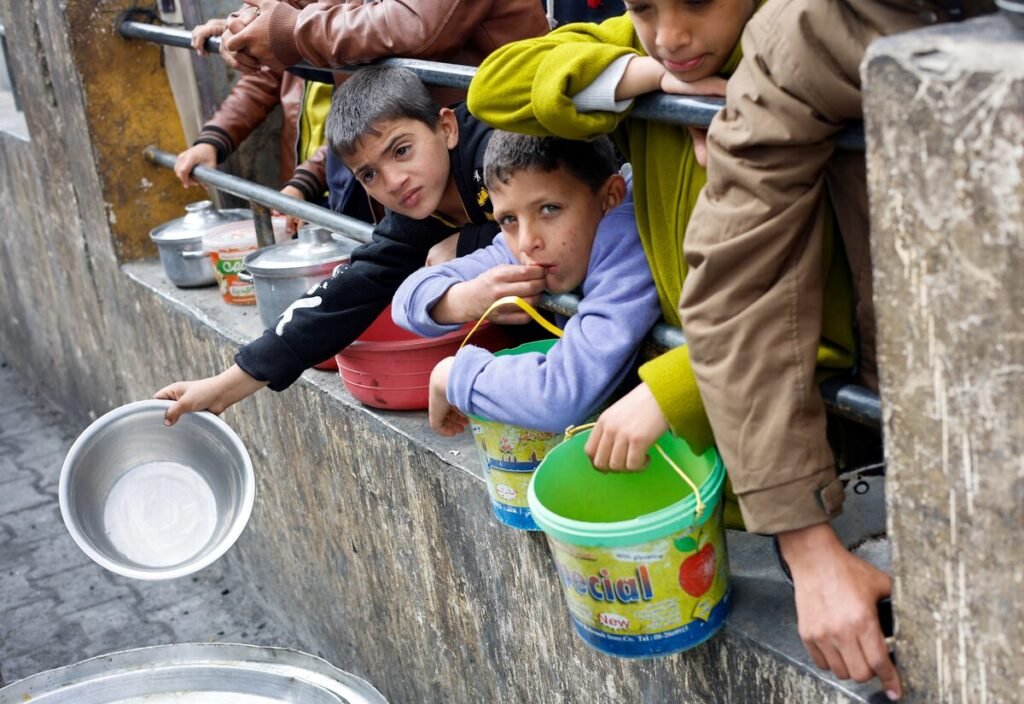Access to clean water is a basic human right, yet for the residents of Gaza, it remains a daily struggle. With a rapidly growing population and limited natural resources, the water crisis in Gaza has reached alarming levels. Decades of conflict, an ongoing blockade, and inadequate infrastructure have severely impacted water quality and availability. In the face of these overwhelming challenges, organizations like “Bithoor Al-Amal” have stepped up, working tirelessly to provide sustainable solutions for the people of Gaza.
The Water Crisis in Gaza: An Overview
The Gaza Strip, a densely populated region, faces one of the most severe water crises in the world. According to reports by the United Nations and local authorities, over 95% of Gaza’s water is unfit for human consumption. The main source of water, the coastal aquifer, has become increasingly saline due to over-extraction and seawater intrusion. Pollution from sewage and agricultural runoff has further degraded water quality, making it unsafe for drinking and daily use.
The situation is compounded by a lack of proper waste management systems and inadequate sewage treatment facilities. Millions of liters of untreated or partially treated wastewater are discharged into the Mediterranean Sea daily, creating an environmental disaster and a health crisis for communities living nearby. This dire state of affairs has left many families with no choice but to rely on expensive and sometimes contaminated trucked water, which strains household budgets and poses health risks.
The Impact of the Water Crisis on Daily Life
The water crisis in Gaza affects every aspect of life, from health and hygiene to education and economic stability. Children, who make up a significant portion of Gaza’s population, are among the most vulnerable. Waterborne diseases such as diarrhea, cholera, and parasitic infections are alarmingly common and contribute to high rates of child morbidity. Poor water quality also exacerbates malnutrition, as children cannot absorb essential nutrients effectively when suffering from chronic diarrhea.
Schools and healthcare facilities are also heavily impacted. Many schools in Gaza lack reliable access to clean water and adequate sanitation, which affects students’ ability to learn and thrive in a healthy environment. Healthcare facilities, already under immense pressure due to frequent conflicts and a strained healthcare system, face additional challenges when clean water is scarce. The ability to maintain proper hygiene, sterilize medical equipment, and care for patients is severely compromised.
The economic implications of the water crisis are equally concerning. Farmers, who rely on water for irrigation, have seen their livelihoods threatened by water shortages and salinity. The agricultural sector, which has historically been a cornerstone of Gaza’s economy, has been devastated. Many families have lost their primary source of income, exacerbating poverty and food insecurity.
Sustainable Solutions: Hope on the Horizon
Despite the seemingly insurmountable challenges, efforts to address the water crisis in Gaza are underway. Local and international organizations have been working to implement sustainable solutions that provide immediate relief and long-term resilience. Among these organizations is “Bithoor Al-Amal,” which has played a crucial role in ensuring access to clean water for thousands of residents.
1. Desalination Projects
One of the most promising solutions for Gaza’s water crisis is desalination. Desalination plants remove salt and impurities from seawater, making it safe for drinking and use. However, these plants require significant energy, which can be a challenge in a region with limited access to reliable electricity. “Bithoor Al-Amal” has been instrumental in supporting small-scale desalination projects that use renewable energy, such as solar power, to operate efficiently. By investing in solar-powered desalination units, the organization ensures that clean water is available to communities even during power outages.
2. Water Filtration and Purification Systems
Another effective approach to providing clean water is the installation of advanced water filtration and purification systems. “Bithoor Al-Amal” has worked with local communities to set up these systems in schools, healthcare facilities, and densely populated neighborhoods. These systems remove contaminants, making water safe for drinking and cooking. The organization also conducts training sessions to educate residents on the importance of water hygiene and how to maintain these systems.
3. Wastewater Treatment and Reuse
Given the scarcity of fresh water, wastewater treatment and reuse have become essential. “Bithoor Al-Amal” has been a strong advocate for developing wastewater treatment facilities that convert sewage into water suitable for agricultural use. By treating and reusing wastewater, the organization not only improves sanitation but also supports farmers by providing a reliable source of irrigation. This initiative helps to alleviate the pressure on the coastal aquifer and promotes sustainable agricultural practices.
4. Community Awareness and Education
Raising awareness about water conservation and hygiene practices is a critical component of any sustainable solution. “Bithoor Al-Amal” has launched community-based education programs that teach families how to use water efficiently, prevent waterborne diseases, and practice good hygiene. The organization has also partnered with local schools to integrate water conservation into the curriculum, empowering the next generation to be stewards of their natural resources.
The Role of “Bithoor Al-Amal” in Creating Lasting Change
“Bithoor Al-Amal” has been at the forefront of the fight against the water crisis in Gaza. The organization’s holistic approach addresses both immediate needs and long-term solutions. By focusing on community engagement, innovation, and sustainability, “Bithoor Al-Amal” has transformed the lives of countless families.
One of the organization’s flagship projects is the installation of rainwater harvesting systems in homes and schools. These systems collect and store rainwater, providing an additional source of clean water during the rainy season. The collected water is filtered and used for drinking, washing, and irrigation. This project has not only improved water access but also fostered a sense of self-reliance among residents.
“Bithoor Al-Amal” also collaborates with international donors and partners to secure funding for large-scale water infrastructure projects. By advocating for policy changes and highlighting the urgency of the water crisis, the organization has successfully mobilized resources to implement impactful solutions. Its commitment to transparency and accountability ensures that every donation is used effectively to create lasting change.
Challenges to Overcome
While progress has been made, significant challenges remain. The blockade on Gaza continues to restrict the import of essential materials needed for water infrastructure projects. Political instability and frequent conflicts disrupt development efforts and exacerbate the crisis. Additionally, climate change poses a growing threat, with rising temperatures and unpredictable rainfall patterns putting further strain on water resources.
Despite these obstacles, the resilience and determination of the people of Gaza, supported by organizations like “Bithoor Al-Amal,” offer hope. Every drop of clean water, every new well, and every trained community member represents a step toward a brighter future.
How You Can Help
Addressing the water crisis in Gaza requires a collective effort. Here are some ways you can contribute:
- Donate to Support Water Projects: Your financial contributions can help fund desalination units, water purification systems, and community education programs. “Bithoor Al-Amal” relies on the generosity of donors to continue its vital work.
- Raise Awareness: Share information about the water crisis in Gaza with your network. Raising awareness can inspire others to take action and support sustainable solutions.
- Volunteer Your Skills: If you have expertise in engineering, public health, or education, consider volunteering your time to support water initiatives. Remote opportunities may be available for those who cannot travel to Gaza.
- Advocate for Change: Use your voice to advocate for policies that support humanitarian aid and the development of critical infrastructure in Gaza. Engaging with policymakers and participating in advocacy campaigns can amplify the impact of grassroots efforts.
Conclusion
The water crisis in Gaza is one of the most pressing humanitarian issues of our time, but it is not insurmountable. With sustainable solutions, dedicated organizations like “Bithoor Al-Amal,” and the support of compassionate individuals worldwide, we can create a future where every child has access to clean water. By investing in water projects, educating communities, and advocating for lasting change, we can make a difference—one drop at a time.
Together, we can transform the water crisis into a story of resilience, hope, and a better tomorrow for the people of Gaza.




